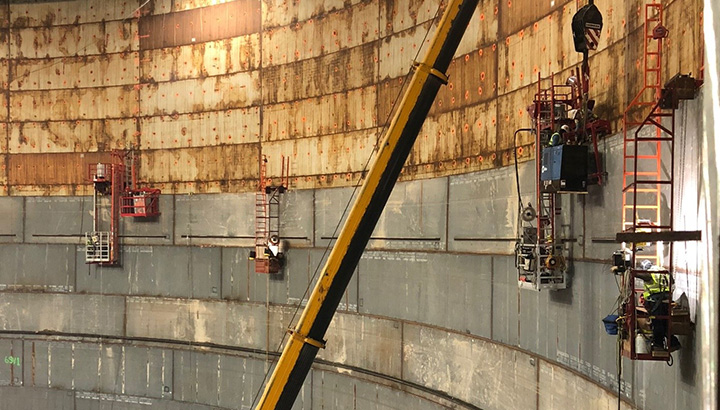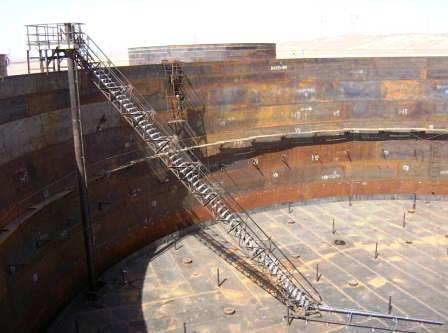Practical Tips for Conducting a Reliable API 650 Welding Inspection
Wiki Article
The Advantages of Welding Evaluation for Improved Safety and Performance
Welding inspections are necessary for making certain that frameworks satisfy strict industry criteria. They play an essential duty in determining problems early, thus enhancing safety and security and lowering the danger of devastating failures. In addition, these assessments can lead to substantial cost financial savings by stopping costly fixings and downtime. As companies aim for better efficiency and reliability, the relevance of a robust inspection procedure can not be overstated. What various other benefits might emerge from a commitment to detailed welding examinations?Making Sure Conformity With Industry Criteria
Guaranteeing conformity with sector standards is vital for preserving quality and safety and security in welding jobs. Complying with recognized protocols not only protects employees but additionally enhances the longevity and performance of the last item. Welding evaluations performed at different phases of the process assistance recognize any variances from these standards, allowing prompt corrective activities. This proactive strategy alleviates the risk of failures that might arise from low-grade workmanship.Compliance with market requirements cultivates trust fund amongst stakeholders, including customers, regulatory bodies, and the workforce. It represents a commitment to excellence and accountable methods, which can bring about raised organization possibilities and a competitive edge on the market - API 650 Welding Inspection. Routine evaluations likewise ensure that techniques and materials utilized line up with the most recent technical improvements and security guidelines. Eventually, adherence to market requirements is not simply a regulatory requirement but a keystone of quality control in welding jobs
Enhancing Security With Early Discovery of Issues
While the main goal of welding evaluations frequently centers on compliance, they play an important function in enhancing safety by making it possible for the very early detection of defects. Recognizing issues such as incomplete fusion, splits, or porosity during evaluations can substantially alleviate the threat of disastrous failings. Early discovery enables prompt interventions, ensuring that damaged welds do not jeopardize architectural honesty.Furthermore, organized assessments foster a society of safety within companies by emphasizing the relevance of quality assurance. This aggressive method not just safeguards employees however additionally safeguards the surrounding atmosphere. Normal assessments can reveal fads in defect incident, enabling modifications in welding strategies and training programs to deal with underlying concerns.
Consequently, welding examinations offer as a crucial guard, bolstering general safety and security and performance by determining issues before they rise into major dangers. This dedication to top quality straight adds to the longevity and reliability of welded structures.
Minimizing Expenses by Protecting Against Failings
By executing detailed welding inspections, organizations can effectively decrease expenses related to failures and rework. The positive recognition of defects during the welding process minimizes the threat of catastrophic failings that can bring about pricey fixings or replacements. Early detection allows for timely treatments, which protects against the rise of small problems into major problems that stress sources and budget plans. Additionally, by ensuring that welds meet defined standards, organizations can prevent delays in task timelines caused by the need for extensive rework or added assessments later at the same time. This not just conserves cash however also boosts functional efficiency. A track record for high quality workmanship can lead to raised client satisfaction and read repeat service, further adding to financial security. Overall, purchasing welding evaluations is a critical method that cultivates expense financial savings while protecting the honesty of welded frameworks.Improving Performance and Long Life of Structures


Welding evaluations play a necessary role in improving the efficiency and longevity of structures, as they confirm that welds are carried out to the highest possible criteria. By recognizing defects early in the welding process, evaluations protect against weak points that can endanger architectural integrity. This proactive approach guarantees that the materials utilized satisfy required specs, consequently enhancing their load-bearing capability and durability.
Additionally, regular tracking of welding practices contributes to the general high quality go to my blog of building projects. The capacity for fatigue and failing over time is considerably decreased when welds are verified for conformity with market requirements. Structures that are developed with effectively examined welds are most likely to experience fewer upkeep problems and enhanced toughness.
Ultimately, rigorous welding examinations not just strengthen the immediate performance of a structure however also extend its functional lifespan, giving long-lasting worth to both home builders and end-users alike.
Promoting a Society of Top Quality and Dependability
A dedication to high quality and integrity in welding practices substantially adds to the overall success of building and construction projects. When companies focus on these values, they promote a society that encourages careful focus to detail and adherence to industry requirements. This culture not only boosts the ability level of welders however additionally promotes liability and teamwork among all stakeholders included in the job.
Routine welding assessments function as a cornerstone in this cultural shift, reinforcing the importance of consistent performance and safety measures (API 650 Welding Inspection). By implementing rigorous inspection methods, firms can recognize possible problems early, mitigating dangers and preventing costly rework. An emphasis on high quality and reliability infuses self-confidence among partners and customers, leading to stronger relationships and boosted track records.
Ultimately, cultivating a culture of top quality and dependability in welding practices not just raises task results but additionally guarantees lasting sustainability and success in the building industry.
Often Asked Questions
What Credentials Should a Welding Inspector Have?
A welding examiner need to possess pertinent accreditations, such as AWS CWI or CSWIP. In addition, they ought to have experience in metallurgy, welding procedures, and inspection methods, in addition to solid analytical skills and focus to information for effective examinations.

How Frequently Should Welding Inspections Be Carried Out?
Welding assessments must be performed consistently, preferably after each significant phase of the welding process. Additionally, periodic evaluations ought to occur based on project requirements, solution problems, and governing criteria to ensure recurring high quality and safety.What Devices Are Utilized During Welding Inspections?
Welding assessments use numerous devices, consisting of ultrasonic testers, magnetic fragment testers, aesthetic inspection tools, and radiographic tools. Each tool serves a particular function, making sure weld high quality and structural honesty via complete assessment and evaluation.Can Welding Inspections Be Performed Remotely?
Welding inspections can indeed be executed remotely using innovative innovations such as drones and specialized video cameras. These devices allow inspectors to analyze welding high quality and honesty from a range, improving performance and security in various settings.What Are the Common Kinds of Welding Problems?
Usual sorts of welding defects consist of porosity, cracks, incomplete blend, undercutting, and slag incorporation. These flaws can compromise the stability and toughness of welds, causing possible failures in architectural applications if not attended to properly.Welding assessments are important for making certain that structures satisfy stringent market criteria. Welding inspections carried out at numerous stages of the process aid recognize any type of deviations from these standards, allowing prompt corrective actions. Welding assessments play an essential function in boosting the efficiency and durability of structures, as they verify that welds are implemented to the highest standards. Welding assessments need to be performed routinely, ideally after each considerable stage of the welding procedure. API 650 Welding Inspection. Welding examinations use various devices, consisting of ultrasonic testers, magnetic particle testers, visual evaluation tools, and radiographic devices
Report this wiki page